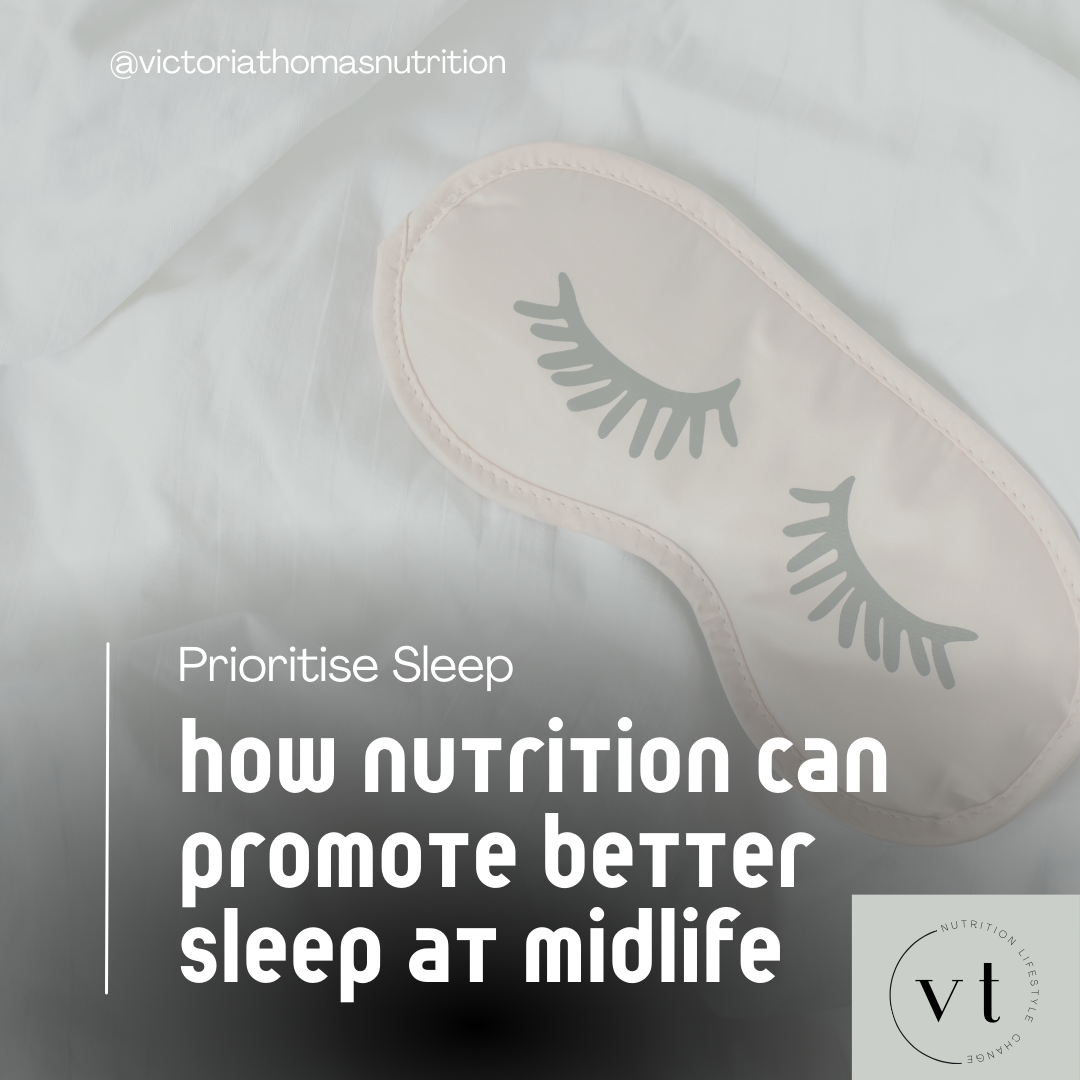How Can Nutrition Promote Better Sleep at Midlife?

Midlife comes with its challenges, sure, but with a few little hacks we can live a full and energised life.
One that feels like a particularly big mountain to climb is sleep, particularly changes in quality and patterns. As we age, that deep, restorative sleep we once took for granted can feel like a distant memory we may never get back. BUT, the power of nutrition and how it can influence our sleep is often underestimated and I think more of you deserve to know the true impact it can have.
At Victoria Thomas Nutrition, I’m shouting from the rooftops about the link that is ‘what you eat is how you sleep’; my aim is to help restore the energy and vitality that a good night's sleep can give you. It’s not an overnight fix and we’re definitely all different, but let me share what I think.
Understanding the link between diet and sleep
The food we eat plays a crucial role in regulating our sleep patterns. Certain nutrients can promote the production of hormones and neurotransmitters that are critical for sleep, such as melatonin and serotonin. A diet lacking in these key nutrients or one that is high in stimulants can significantly disrupt our sleep.
As we step into midlife the added pressures and physiological changes make sleep (or quality sleep) more difficult. Adjusting your nutrition (and lifestyle habits), can bring lots of benefits and improved sleep is one I am definitely thankful for.
Nutrition hacks for sleep
🤍 Embrace complex carbohydrates, particularly at night
Think whole grains, legumes, and vegetables such as sweet potato, butternut squash and parsnips. These foods are not only nutritious but as they are digested more slowly, this slow and steady release helps maintain stable blood sugar levels throughout the night preventing spikes and crashes that can disturb our sleep. Consuming complex carbs can increase serotonin levels - a neurotransmitter that helps regulate mood and promotes relaxation thus aiding a more restful night’s sleep. Foods rich in complex carbs contain nutrients like magnesium, which is involved in the production and regulation of melatonin, the hormone that signals to your body that it's time to rest.
Add brown rice, quinoa or a sweet potato to your evening meal and say hello to the beginning of that perfect night’s slumber.
🤍 Prioritise protein, particularly at breakfast
Lean proteins such as turkey, chicken, fish, and tofu contain the amino acid tryptophan, another building block of serotonin. Including a portion of these proteins in your evening meal can facilitate a smoother transition into sleep. Think about a turkey salad or a piece of grilled salmon with veggies for a sleep-supportive meal.
The real game-changer however, comes from the consumption of protein at breakfast. Including protein in your breakfast can help stabilize those all important blood sugar levels by slowing down the digestion and absorption of carbohydrates. This prevents rapid spikes and crashes in blood sugar which can disrupt sleep patterns. Stable blood sugar levels promote a more even release of energy throughout the day, leading to better sleep quality at night. Consuming a protein-rich breakfast can help you feel fuller for longer, reducing the likelihood of mid-morning hunger pangs and potential energy dips. By maintaining a consistent energy level throughout the day, you're less likely to experience sleep disturbances caused by hunger or discomfort.
🤍 Limit caffeine and alcohol
It's well-known that caffeine and alcohol can disrupt sleep patterns, but in the busy midlife stage, we might find ourselves relying on these more than we should. Try to limit caffeine intake to the morning hours and reduce alcohol consumption, especially close to bedtime. Opting for herbal teas, such as chamomile or peppermint, can be a soothing alternative in the evening. They have other great nutritional benefits too for an all-round win-win 🤩
🤍 Incorporate magnesium-rich foods
Magnesium is a mineral that plays a key role in aiding relaxation contributing to a peaceful night's sleep. Foods rich in magnesium include leafy greens, nuts, seeds, and whole grains. A handful of almonds or a spinach salad can be a great addition to your dinner routine.
🤍 Stay hydrated, but not too late
Staying adequately hydrated is important for overall health, but timing is key to avoid disrupting sleep with those frankly annoying bathroom trips. Nail your hydration earlier in the day and reduce your fluid intake in the hours leading up to bedtime.
🤍 Taking the first step
As I say (all the time 😆) improving your nutrition for better sleep doesn't have to be complicated. Simple, mindful adjustments to your diet can make a huge difference to the quality of your rest during these pivotal midlife years. At Victoria Thomas Nutrition, I’m committed to guiding you through this time with personalised, realistic solutions that align with your lifestyle and preferences.
The journey to better sleep and overall well-being starts with the choices we make when we eat. The simple things are sometimes the most powerful; we just need someone to show us the way.
Book your health review here.
